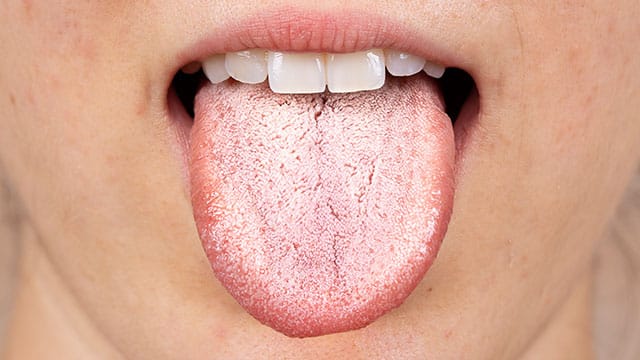What Causes White Tongue?
The surface of your tongue is covered with tiny bumps called papillae. When these papillae become inflamed and swollen, bacteria, food debris and dead cells can get trapped between them. This gives the appearance of a white coating on your tongue.
But what makes the papillae swell up in the first place? Possible causes include:
- Poor oral hygiene.
- Dry mouth (xerostomia).
- Dehydration.
- Mouth breathing.
- Injury or irritation to the tongue.
- Fever.
- Tobacco.
- Excessive alcohol use.
Sometimes, white tongue isn’t caused by inflammation of the papillae. Instead, it might be caused by:
- Oral thrush (a yeast infection).
- Leukoplakia (white patches on the soft tissues of your mouth).
- Oral lichen planus (an inflammatory condition that causes white patches and open sores).
- Oral cancers, including tongue cancer.
- A compromised or suppressed immune system.
- Syphilis.
Bad Breath and White Tongue
When bacteria, food debris and dead skin cells become trapped between inflamed papillae on the tongue, they start to decay. Of course, this can lead to a very unpleasant smell. It can be hard to remove this material because of the swelling, especially at the back of the tongue, so your bad breath might persist even if your oral health and hygiene is otherwise excellent. So now you know the connection between bad breath and white tongue, what can you do to fix them?
White Tongue Treatment
Here are some things you can start doing right now to get a clean tongue and fresh-smelling breath:
- Improve your oral hygiene routine. Brush your teeth twice a day, and floss daily to keep food debris and bacteria to a minimum.
- Clean your tongue. Gently brush your tongue with your toothbrush after you brush your teeth, and use a tongue scraper to remove the white film on your tongue. Consider a multifunctional toothbrush, like the Colgate® 360°® Total® Advanced Floss-Tip Bristles Toothbrush, which also features a wraparound tongue and cheek cleaner to remove odor-causing bacteria.
- Rinse your mouth. You can add a mouthwash to your daily routine for extra-fresh breath.
- Drink plenty of water. This will help prevent dry mouth, which can make bad breath and white tongue worse.
- Choose your food carefully. To avoid making your bad breath even worse, try to limit strong-smelling foods like onion and garlic until your oral hygiene is back in tip-top shape.
- Visit your dentist. Schedule a check-up with your dentist. They will assess your oral health and provide tailored advice to help you banish bad breath and white tongue. And if there are other oral health conditions contributing to your problem, your dentist will be able to spot and treat them.
- Visit your doctor. If you think infections, health conditions, or medications might be contributing to your bad breath and white tongue, speak to your doctor for advice. You may need treatment, or an adjustment to your current treatment regime.
Bad breath and a white tongue have many causes in common and, as such, they often appear together. Luckily, there are some things you can start doing right now to change this and improve your oral health in addition to the white tongue treatment. Brush your teeth twice a day, floss daily, use a tongue scraper to effectively clean your tongue, and be mindful of the foods you eat. And drink more water to eliminate dry mouth; this is good for your whole body too!
This article is intended to promote understanding of and knowledge about general oral health topics. It is not intended to be a substitute for professional advice, diagnosis or treatment. Always seek the advice of your dentist or other qualified healthcare provider with any questions you may have regarding a medical condition or treatment.
ORAL HEALTH QUIZ
What's behind your smile?
Take our Oral Health assessment to get the most from your oral care routine
ORAL HEALTH QUIZ
What's behind your smile?
Take our Oral Health assessment to get the most from your oral care routine
Join Us
Get the best of your oral health routine and take it to the next level with expert advice, recommendations, products and solutions and special offers.
Join Us
Get the best of your oral health routine and take it to the next level with expert advice, recommendations, products and solutions and special offers.















